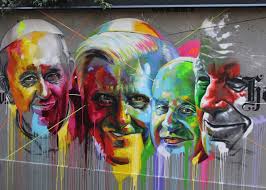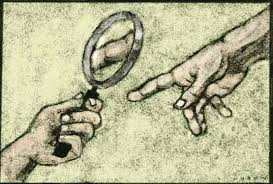Second Sunday of Advent
“Prepare the way of the Lord.” Mk. 1:1
Have you ever noticed that the people God chooses to announce his presence and prepare His way in the world are often a bit on the odd side, even a tad peculiar?
They’re very seldom the power people of their day. They’re almost never the kings and the queens. Not one of them is a great military leader like Julius Caesar or Alexander the Great. They’re usually not the noted intellectuals of their time or the great artists or the wealthiest or the most famous.
Instead, they’re illiterates like Bernadette of Lourdes; or a poor, uneducated wife of a man named Joseph living in the backwater village of Nazareth.
What’s even more shocking is that many of them were great sinners!
Look at some of them: Moses, a murderer; Paul of Tarsus, a persecutor; Augustine of Hippo, the father of an out-of-wedlock child who he abandoned; Francis of Assisi, a playboy turned beggar; Thomas Merton, a life-of-the-party lover of worldliness; Dorothy Day, an unwed mother. And on and on it goes.
Or, take today’s gospel as an example.
It features a hippie-like person called John the Baptist who lives in a desert, is clothed in camel hair, and feeds on locust and wild honey: once again a perfect example of the word of the Lord bypassing the high and the mighty, and instead landing squarely on the shoulders of the very eccentric and extraordinary.
Why does God do this? Why does He continue to choose such unusual people to tell us who He is and what He wants from us? Why not the powerful? Why not Taylor Swift or Aaron Rogers or Warren Buffett or some other powerfully prominent person who would immediately get our attention?
Is God lacking in the advertising and sales department, or does He have some other motivation?
When you look closely, you notice that there seems to be something about the poor, the small folk, and the unlikeliest that absolutely charms God.
What is it?
According to all four of the gospels and the writings of St. Paul, the answer, in a word, is powerlessness. It is precisely their emptiness, their barrenness, their vulnerability that overwhelms the God of Jesus and causes Him to fall in love.
It’s almost like God can’t help Himself. He can’t resist the temptation to fill up whomever He finds to be open to the reception of abundance with the lavishness of His love.
What God is trying to teach us by using characters like John the Baptist is that the experience of powerlessness is where we all must begin. It seems to be the secret place where God has hidden holiness and wholeness – a place which only the humble can find.
Richard Rohr, the Franciscan priest, in a book entitled Breathing Under Water, puts it this way:
“Until you bottom out and come to the limits of your own fuel supply, there is no reason for you to switch to a higher octane of fuel … Until there is a person, situation, event, idea, conflict, or relationship you cannot ‘manage,’ you will never find the True Manager. So God makes sure that several things will come your way that you cannot manage on your own.”
Embrace those ways. Learn from them. Allow them to teach you what is truly important and truly God-like.
John the Baptist is perhaps the ultimate representative of doing just that.
Born into great wealth and prominence as the son of a High Priest, he could have remained totally secure resting within the comfort zone of all of the fineries of life. But there was a certain restlessness within him, a hunger for going deeper.
And so, stripped of all of life’s certainties, he became his True Self before God. He abandoned all the temptations around him and discovered a unique freedom – a freedom to give himself over to a life of full conversion. As a result, he was embraced by God and became the “greatest of all the prophets.”
To put it in the simplest of terms, John emptied himself of his ego, and made room in his heart and soul for someone far greater than himself.
Isn’t that the same thing we do when we “fall in love?” Isn’t there a dying to the ego within us so that we can create a very special space for that favorite someone? Don’t we “move over” and get out of the way?
This is the challenge of Advent for all of us: a self-emptying, a making room. Then, the child Jesus can fulfill his one true ambition: being born in the “manger” of our hearts and souls.
“Prepare the way of the Lord,” the gospel proclaims. Few did that more faithfully and fully than John the Baptist.
Now it’s our turn.
It’s our turn for each of us to create our own version of John the Baptist. And, to be sure, we don’t have to dress like him or eat like him or baptize in a river like him.
We’re asked instead to create a heart like his. Create a soul like his. Create a whole new version of what powerlessness would look like in our day and time. Create an entirely new vision of the freedom than can be ours if we were willing to let go of our gigantic egos and their never-ending demands. Create a whole new image of what emptying ourselves and being fully open to God moving in would look like.
That’s what Advent is truly all about – preparing a home, a space, a room into which our God gets to move.
Prayer is one of the best agents to assist us in this process. Perhaps this one in particular is worth meditating on this Advent:
“Nothing is more practical than finding God, than falling in love in a quite absolute, final way. What you are in love with, what seizes your imagination, will affect everything.
It will decide what will get you out of bed in the morning, what you will do with your evening, how you spend your weekends, what you read, whom you know, what breaks your heart, and what amazes you with joy and gratitude.
Fall in love, stay in love, and it will decide everything.” Pedro Arrupe, S.J.
Or, to borrow from today’s gospel, it will “prepare the way of the Lord.”
Ted Wolgamot, Psy.D.
11809194.1
12/8/17



